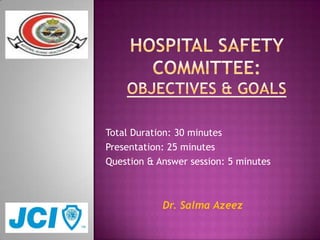
Hospital safety committee ptlls assignment 1
- 1. Total Duration: 30 minutes Presentation: 25 minutes Question & Answer session: 5 minutes Dr. Salma Azeez
- 2. To provide a multi- disciplinary forum and framework which identifies and manages environment of care issues, thus promoting a safety environment for our patients, visitors and staff.
- 3. 1. To oversee, guide and ensure towards incidences reported. the following aspects of 4. Appropriate storage and safety in the hospital: safety practices with regard Patient safety to all Hazardous materials including waste Employee safety management. Radiation safety Environment /Facility safety 5. Analyze the staff injuries reported and other illness Disaster Management caused at work. 2. To promote a culture of ‘ Do not harm’ and report any 6. Teaching and training ‘Near Misses” programs conducted for all levels of staff for safety of 3. To review the incident report patients and personnel. analysis & action taken
- 4. A Risk management program in hospitals is imperative because: •To treat patients in a safe environment. •We are constantly exposed to external and internal risks. •To reduce errors that are costly in terms of damage.
- 5. Patient Safety SET THE SAFETY Employee CULTURE…… Safety Laboratory •Non punitive Safety •Transparent Emergency & • Need to know •Speak out Disaster • If we don't know, how Preparedness can we correct it? Hazardous • It can happen to anyone Materials of us! Surgical •Involvement of Safety Clinicians for clinical Facility safety safety issues
- 6. “ A sustained, proactive process of identifying, avoiding and rapidly resolving errors, omissions, mishaps and miscommunications that could affect patients well being at any point of time”’
- 7. Accuracy of patient identification. Safety of using medications. Risk of Health care-associated infections. Accuracy and complete reconciliation of medications across the continuum of care. Risk of patient harm resulting from falls. Surgical safety. Health care-associated Pressure ulcers Emergency preparedness…… and many more ! (use of: safety bands, non skid slippers, markers on surgery sites are helpful)
- 8. VERBAL ORDERS: ERROR IDENTIFY PATIENTS PREVENTION: CORRECTLY Use at least (2) ways to identify •Read back policy Avoid when patients while giving medicines, giving blood or blood products, taking blood possible. samples or providing any other •Enunciate slowly and distinctly. treatments or procedures. The patients •State numbers like pilots Room No cannot be used to identify (i.e., “one-five mg” for 15 mg). patients. (call patient name loud & clear and wait • Spell out difficult drug names for patient acknowledgement as well as Specify concentrations match wrist identification e.g. MR no.#) (10 Cohen MR. Medication Errors. Causes, Prevention, and Risk Management; 8.1-8.23.)
- 9. Language should be simple and understood. A read back or narrate can help Increase health literacy of patients. Standardize the handover process and allot sufficient time Relevant information should be available to every one concerned. Patients should be aware of the medicines, dosages and intervals of administration Patient and families should be involved in the decision making. (Comments: educate patient about: name of drug, dose, how-to- take, written instructions, & known side effects. Patient and relatives should sign consent for control drug therapies/surgeries)
- 10. Implementation of strategies that make alcohol-based hand-rubs readily available at points of patient care. Access to a safe, continuous water supply at all taps/faucets. Staff education on correct hand hygiene techniques; Use of hand hygiene reminders in the workplace. Measurement of hand hygiene compliance through observational monitoring and other techniques.
- 11. Patient Falls Allergy assessment Pressure Ulcers Medication Errors Adverse drug reactions Vulnerable patients
- 12. Risk assessment in different groups of employees . Pre Joining formalities: Medical fitness Periodic health check up policy („Periodicity‟ differs in different groups of employees). Medical Benefits Post exposure prophylaxis… needs to be streamlined.
- 13. •Installation of warning signals in appropriate areas - Bilingual •Monitoring ofRadiation safety & monitoring devices. • Radiation safety data. •Standardize the personal protective wearing for paramedics.
- 14. •Correct patient identification. •Correct sample identification. •Reduce typographical errors. •Safety in blood bank •Transfusion transmitted reactions. •Set protocols in case of a spill.
- 15. Know the emergencies/disasters relevant to your institute/workplace. Code system Location of ramps, fire extinguisher, evacuation plan etc. Appropriate personal protective measures to be procured for emergencies. Training, training, training… Do mock drills
- 16. CODE RED FIRE CODE BLUE ADULT CARDIOPULMONARY ARREST PEDIATRIC CODE PEDIATRIC CARDIOPULMONARY ARREST BLUE CODE ORANGE HAZARDOUS MATERIAL SPILL / BIOLOGICAL AGENT HAZARD CODE YELLOW INFANT / CHILD MISSING CODE GRAY SECURITY THREAT CODE BLACK DISASTER
- 17. •Know the hazardous material in relevant to your area. •Material safety data sheets. •Personal protective equipment boxes. •Training •IncidentReporting in case of spills
- 18. •Incomplete Consent forms. •Marking of site pre operatively. • Pre anesthetic review •Operative notes (to be authenticated)
- 19. Nursing call bells Checking and maintenance Safety belts in stretchers/wheel chairs Signage – danger/warning Regular checking of alternative sources of supply CORDON off renovation sites No lose wires/open electric circuits Disabled friendly washrooms Reactivation offire detection systems in new building Emergency lights in staircases
- 20. To develop a culture of patient safety To describe approach for measurement and reporting on patient safety To find out frequent problems that our Institute encounters . Identify accountabilities To develop the solutions for patient safety
- 21. Safety Reliability Change Data Culture Leadership Pyramid
- 23. THANK YOU
